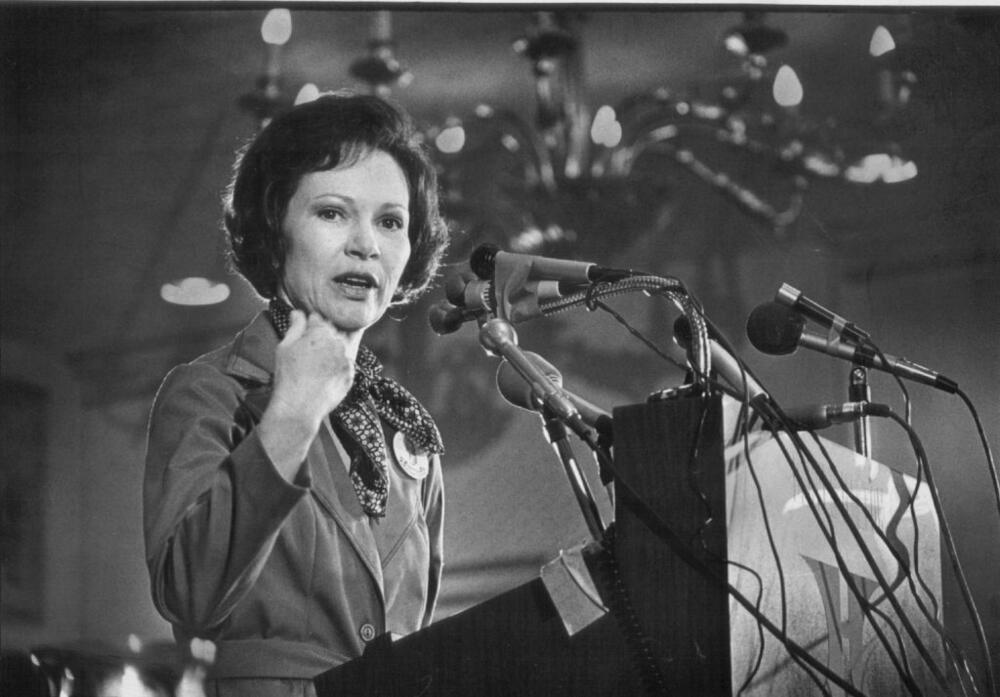
Section Branding
Header Content
How the Rosalynn Carter Institute for Caregivers advocates for Georgians caring for loved ones
Primary Content
GPB's Peter Biello speaks with Lezlie Poole of the Rosalynn Carter Institute for Caregivers.

All this week, GPB is highlighting the vital role that caregivers play across the state. Recently, GPB’s Peter Biello spoke with Lezlie Poole, Innovation Manager at the Rosalynn Carter Institute for Caregivers about her organization's advocacy work. And they started their conversation talking about Rosalynn Carter and what inspired her advocacy...
TRANSCRIPT:
Lezlie Poole: It started when she was 12, so she has been a lifelong family caregiver. Her grandfather got sick and had to be cared for in the family home, and her mother took on the role of primary caregiver, and then she had to kind of get the house settled and care for her younger siblings. So, learning what family caregiving is happened at a very young age for her so when you look at her life, it really shows her demonstration of the love that she has for family caregivers and really understanding the journey they go on. It's not all fun and there's some really hard parts in it, but also there can be some really beautiful parts as well.
Peter Biello: And how does the Rosalynn Carter Institute advocate for caregivers today?
Lezlie Poole: A couple of different methods. I would say the one that really sticks out is we do a lot of evidence-based work. So we do lot of research, we listen to caregivers, we really try to see where they're at. So what really makes a difference in a caregiver's life? What do they really need to know? Whether that's teaching problem-solving to caregivers. Whether that's teaching caregivers how they can care for themselves and then also care with somebody with advanced stage Alzheimer's. That's how we spread the word in the field and really show what's making the difference.
Peter Biello: So what resources does Georgia have for caregivers that people giving care right now may not know about?
Lezlie Poole: First and foremost, we tell all of our caregivers, if you're located in the state of Georgia, know where your area agency on aging is. They have a lot of information to help you. They have lot of the information they want to help you with. They don't know you're out there, so you have to come and say, "Hey, I'm a caregiver. What is there for me?" I also tell people to not be scared to look for what I call "unusual" caregiving resources. One of the things I'll tell you is that we did a lot of work at RCI with emergency preparedness for caregivers. We realized very early on in my tenure at RCI that a lot of everyday resources that people in our community, especially non-caregiving peers in our committee have access to, are not really focused on if you're caring for someone else. So if you are worried about the new hurricane season that's coming up or bad weather, don't be scared to go out and reach out to your first responders or your emergency management offices. They want to help you. They just need to know where you are.
Peter Biello: The Rosalynn Carter Institute is merging with the Carter Center's mental health program. Can you talk a little bit about how that merger is going to help the RCI meet its goals?
Lezlie Poole: So the merger is super exciting in several different capacities. One, it brings all of Mrs. Carter's work under one big house. So we're all in the same space together, which is really fun to think about and all the things that we can do. I think when we look about caregiving and how this merger is gonna advance caregiving, it's gonna do it through two things really primarily. One. We are now from a national organization, a national resource. We then become global, which means we get to share globally what we've done for the past 40 years and how we've helped caregivers in our home country and what that looks like. And then also it allows us to really get best practices from other countries that have been doing it, that other countries that have taken on caregiver initiatives and implemented it through a national sense and really taking care of their caregivers through a bunch of different resources. How can we take that and bring that back over here so that all caregivers feel seen, they feel supported, they feel like somebody's there for them? We're using what's been established already for decades and decades. It's really going to be helpful in seeing what others are doing, but then also showcasing what we've done and how we can help in different kind of sectors of the world. And that's really exciting.

